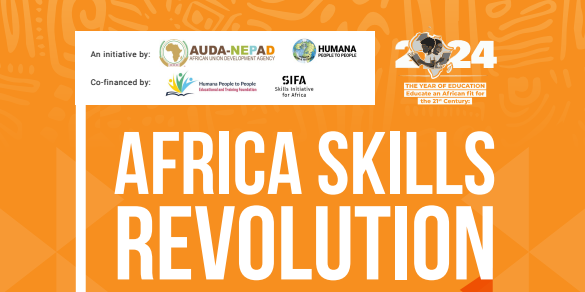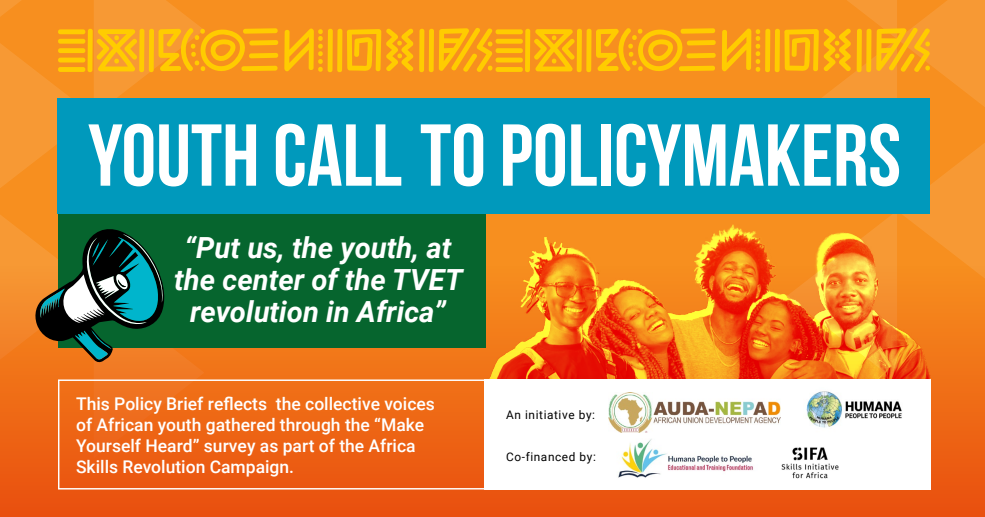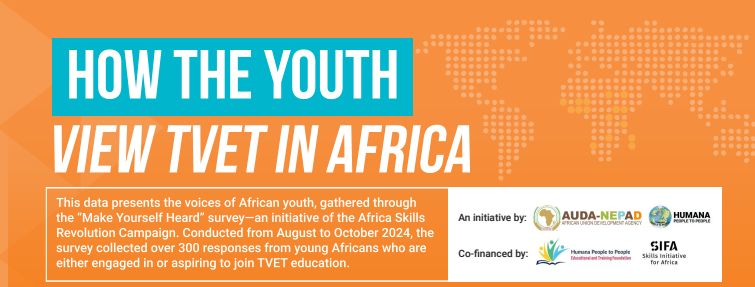Growing up in Namibia’s remote Rola community, I experienced firsthand the challenges of limited access to technology. This lack of connectivity meant young people in my area struggled to access vital information and opportunities. Determined to change this, I turned to TVET to gain the skills to address these gaps. Through my training in digital platform development, I created SILA-EB, a system designed to connect underserved communities with essential resources. TVET also gave me the confidence to involve women and youth in using these tools, inspiring them to embrace technology to improve their livelihoods.
Africa Skills Revolution
Putting youth at the centre of the Technical and Vocational Education and Training revolution across the continent

The Initiative
Africa Skills Revolution is an initiative focused on promoting youth-led dialogue on skills development and TVET in Africa, spotlighting the voices and talents of a generation ready to lead.
AUDA-NEPAD and Humana People to People launched the campaign to spotlight TVET as both a path to employment and a catalyst for inclusive growth, innovation, and youth-led development.
This pan-African initiative unfolded through months of virtual events, youth dialogues, storytelling, data collection, and a continent-wide competition.
We’re proud to share the outcome - a report, capturing the motivations, challenges, and aspirations of TVET youth. We hope it sparks action to shape stronger skills systems across Africa.


Anchored on three pillars, the Africa Skills Revolution sparked dialogue, competitions, and surveys to actively involve the youth.
Engage
Dialogue and Youth-Centred Advocacy Campaign
We engaged young people across Africa to reshape perceptions of TVET by sharing accurate, data-driven insights and showcasing its role in building skills, advancing careers, and driving societal progress.
Elevate
The 2024 Africa Skills Revolution Competition
We celebrated youth innovation and spotlighted how African TVET graduates are driving change in their communities and countries. More than a contest, it was a powerful reminder that with the right skills, youth don’t just imagine change — they lead it.
Connect
The “Make Yourself Heard” Survey
We created a platform to capture how youth experience and perceive TVET, from barriers to enablers and their vision for building a more inclusive and efficient TVET system across the continent.
Youth Voices
A generation ready to lead. It's time to put their voices at the center.
The Africa Skills Revolution stands as a powerful testament to the potential of young people when they are empowered with the right tools, opportunities, and platforms to lead.
Discover the insights gathered from the advocacy campaign, the competition, and the youth survey — now forming a powerful foundation for action. These findings reflect the real experiences, challenges, and aspirations of young people across Africa.
Their voices won’t be left behind, they’re being brought to the heart of the conversation on TVET and skills development.

PERCEPTIONS AND MOTIVATIONS BEHIND TVET
Understanding the motivations driving young Africans to pursue TVET is foundational to addressing barriers, enhancing accessibility, and designing systems that resonate with their aspirations.
Across Africa, TVET is seen by young people as a launchpad to entrepreneurship, positive purpose and economic progress. Nearly half enrolled to secure a relevant job (42%) or gain hands-on training (41%). These choices reflect a growing demand for learning that leads directly to opportunity. Notably, 38% are motivated by a desire to make a positive impact on society, underscoring their belief in TVET’s transformative potential.
A strong majority of people who have experienced TVET (80%) believe it is vital to their country’s socioeconomic development, with 72% agreeing that it aligns with real-world job markets. Vocational education isn’t just seen as training programmes — they’re launchpads for livelihoods, dignity, and sustainable development and growth.
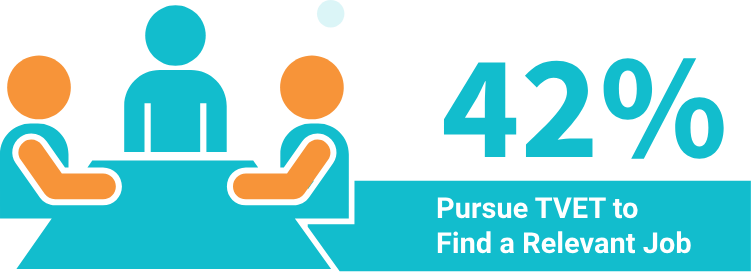

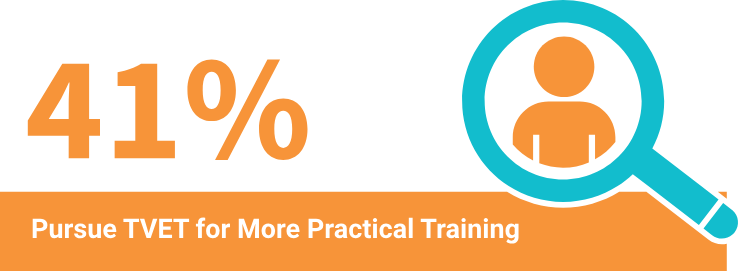
THE DRIVE BEHIND TVET CHOICES
TVET PROGRAMMES
Addressing the barriers that prevent African youth from accessing TVET is crucial to advancing inclusive systems, ensuring equitable access, and strengthening the continent’s young workforce.
Access to TVET remains uneven. For most young people (72%), the biggest barrier is financial — many simply can’t afford it. Others struggle with a lack of information (54%) or live too far from training centres (38%), especially in rural areas.
But their ambitions are clear: today’s youth want more than technical know-how. They’re calling for digital skills (68%), entrepreneurship training (70%), and soft skills (66%) that prepare them for a fast-changing economy — and for life. They view vocational education as a launchpad for self-sufficiency and entrepreneurship, not merely a pathway to employment.
Challenges in Accessing TVET Programmes



YOUTH OVERCOMING BARRIERS
CAREER DEVELOPMENT
The survey offers a multi-dimensional view of the enablers and barriers young Africans face when entering the job market after graduating from vocational education.
Financial support continues to be the most significant factor influencing opportunities for young Africans. Nearly half say scholarships or funding (46%) are key to building a career after TVET. But money isn’t everything. Many also call for job placement opportunities (19%), and stronger networking opportunities (19%).
These responses point to a clear message: success after training depends not only on skills but also on the systems that connect youth to real-world work and support youth as they transition into the labor market.
Effective Support for Career Development



UNLOCKING SUCCESS THROUGH ENABLERS
YOUTH ARE HELPING RESHAPE THE TVET NARRATIVE
Understanding young people’s perspectives and aspirations is essential to recognizing them as active contributors in shaping the direction and relevance of training.
Young Africans are not just participating in vocational education — they’re transforming it. Over 80% of young people see themselves as key actors in shaping and advocating for TVET, helping it compete with traditional higher education pathways. Young people do not want to be just beneficiaries, but active agents and co-designers of TVET strategies.
They also recognize that changing perceptions requires them to lead by example. In fact, 86% of youth say they would recommend TVET to their peers.
The Role of Young People in Shaping TVET
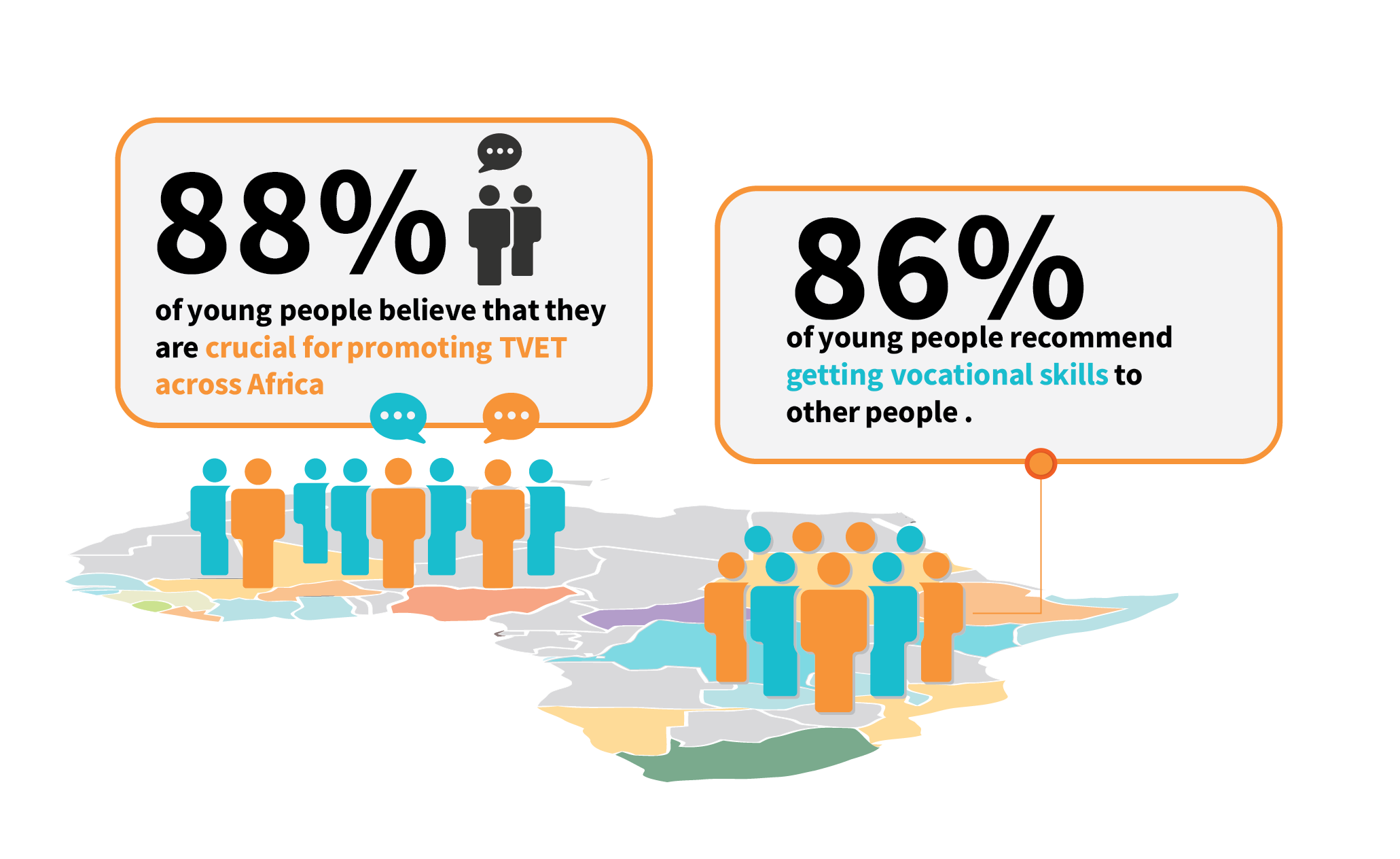
THE REAL-WORLD RELEVANCE OF TVET
YOUTH CALL TO POLICYMAKERS
We have now heard what young people have to say about TVET, but what’s the way forward? Click through the tiles to explore what young Africans are asking of policymakers. From access and equity to digital innovation and entrepreneurship, these recommendations are rooted in lived experience.
Each priority reflects their vision for change and marks the beginning of a movement that places Africa’s youth at the heart of building a more resilient, skilled future.
- Invest in new TVET centers in rural areas with modern facilities and technology.
- Develop scholarship programs and financial aid for marginalised groups (women, refugees, persons with disabilities).
- Provide subsidized transport or boarding facilities to support rural youth attending training centers.
- Revise curricula in collaboration with industry stakeholders to meet market needs (e.g., renewable energy, healthcare, digital tech).
- Integrate work-based learning and apprenticeships for hands-on experience.
- Embed soft skills training to improve overall employability.
- Anticipate evolving skills needs through strong mechanisms to align with labor market demands.
- Introduce entrepreneurship modules in TVET curricula, including business planning and financial management.
- Create incubation programs and seed funding to support graduates' businesses, especially in rural areas.
- Partner with financial institutions to develop tailored loan schemes for young entrepreneurs.
- Encourage women in male-dominated fields (e.g., STEM) through outreach campaigns and financial incentives.
- Provide childcare and flexible class schedules to support students with caregiving responsibilities.
- Create safe, inclusive environments and offer support for female students.
- Design programs for marginalized groups, including financial support and recognition of prior learning.
- Develop online and hybrid TVET programs to accommodate remote learners.
- Incorporate digital literacy training to equip students for the modern workforce.
- Use digital tools for mentorship and networking across regions.
- Establish youth advisory councils to incorporate young people's perspectives into TVET policy and curriculum.
- Conduct surveys and focus groups to gather actionable insights from youth about TVET.
- Create collaborations between governments, private sector, and educational institutions to co-create TVET programs.
- Encourage private sector investment in infrastructure and equipment to ensure industry standards.
- Create internships and apprenticeships to transition students into employment.
- Complement TVET with career guidance and job counseling to help youth navigate the labor market.
- Launch nationwide campaigns highlighting diverse success stories of TVET graduates.
- Engage media and influential figures to shift perceptions of TVET as a valuable career pathway.
- Encourage family support through targeted awareness campaigns.
- Integrate climate-smart and sustainable practices like renewable energy and sustainable agriculture into TVET training.
- Support initiatives addressing key challenges like waste management and water conservation.
- Track alignment of TVET programs with Agenda 2063 goals for continuous improvement and relevance to Africa's development priorities.
Resources
Want to know more?
Download below the full Youth Voices Report, which captures critical insights, youth-led recommendations, and powerful evidence to inform policy, practice, and future programming. Whether you're a policymaker, educator, or development partner, this report is designed to support more inclusive, responsive, and impactful TVET systems across Africa.
